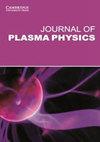列纳德-伯恩斯坦碰撞算子的结构保留粒子离散化
IF 2.1
3区 物理与天体物理
Q2 PHYSICS, FLUIDS & PLASMAS
引用次数: 0
摘要
碰撞是等离子体中的一种重要耗散机制。在对碰撞算子进行数值逼近时,必须保留其数学结构,以便在离散水平上保留热力学定律。在考虑粒子方法时,这一点尤其具有挑战性。一个简单但常用的碰撞算子是 Lenard-Bernstein 算子或其修正的能量和动量守恒对应算子。在这项工作中,我们提出了这种算子的宏观粒子离散化方法,它可以证明是能量和动量守恒的。本文章由计算机程序翻译,如有差异,请以英文原文为准。
A structure-preserving particle discretisation for the Lenard–Bernstein collision operator
Collisions are an important dissipation mechanism in plasmas. When approximating collision operators numerically, it is important to preserve their mathematical structure in order to retain the laws of thermodynamics at the discrete level. This is particularly challenging when considering particle methods. A simple but commonly used collision operator is the Lenard–Bernstein operator, or its modified energy- and momentum-conserving counterpart. In this work, we present a macro-particle discretisation of this operator that is provably energy and momentum preserving.
求助全文
通过发布文献求助,成功后即可免费获取论文全文。
去求助
来源期刊

Journal of Plasma Physics
物理-物理:流体与等离子体
CiteScore
3.50
自引率
16.00%
发文量
106
审稿时长
6-12 weeks
期刊介绍:
JPP aspires to be the intellectual home of those who think of plasma physics as a fundamental discipline. The journal focuses on publishing research on laboratory plasmas (including magnetically confined and inertial fusion plasmas), space physics and plasma astrophysics that takes advantage of the rapid ongoing progress in instrumentation and computing to advance fundamental understanding of multiscale plasma physics. The Journal welcomes submissions of analytical, numerical, observational and experimental work: both original research and tutorial- or review-style papers, as well as proposals for its Lecture Notes series.
 求助内容:
求助内容: 应助结果提醒方式:
应助结果提醒方式:


